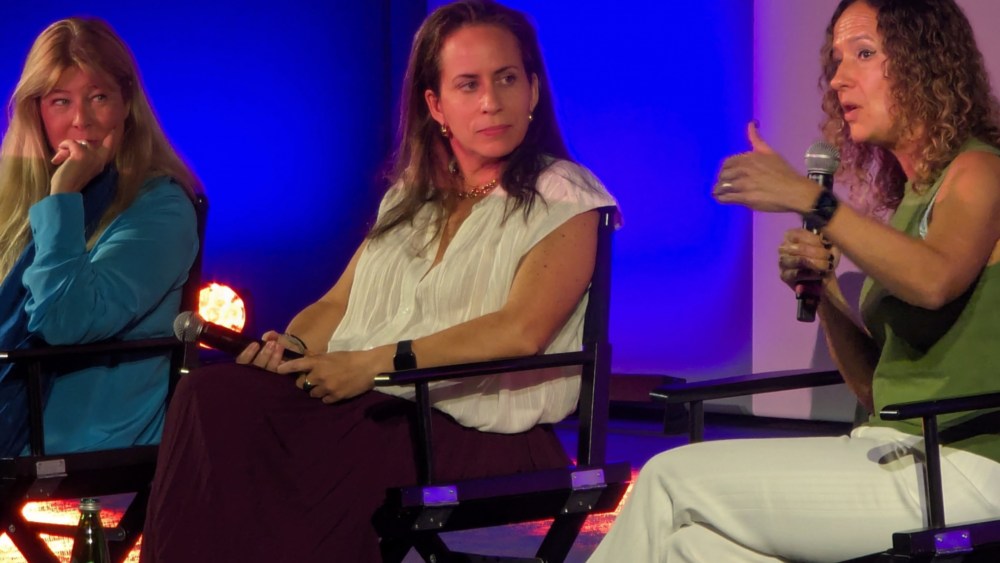Former Channel 4 head of drama Caroline Hollick didn’t mince words on Wednesday as she took aim at cautious execs in the U.K.’s struggling TV industry who are threatening to undo the gains made during the post-MeToo reckoning on gender parity.
“As the industry shrinks… everyone is going back to the familiar writers that they know, who have long track records and all the commissioners feel comfortable with. And I’ll be really honest: Not that many of them are women,” Hollick said during a panel discussion at Rome’s MIA Market.
“That’s affecting representation across the board. And that’s what any industry does when it’s on the back foot,” she continued. “They go back to what they know and what they’re familiar with. I’m not sure it’s good for the industry. I certainly don’t think it’s good for audiences. We just have to keep pushing for the stories that we really believe in.”
Wednesday’s session in Rome presented the conclusions of a recent report by the European Audiovisual Observatory which found that just 27% of professionals working in the European drama industry between 2019 and 2023 were women.
The findings underscored the ongoing challenge to achieve gender parity in the continent’s audiovisual sector, with Laura Abril, EVP of scripted and global business development at Buendia Estudios in Spain, noting: “We’ve progressed, but there’s still [a long way] to go.”
The panel highlighted the precarious give and take in recent years for women working in television on the road to 50-50 representation. In the U.S., Abril noted, sweepings efforts under the second Trump administration to roll back diversity, equity and inclusion policies met with little resistance in Hollywood, with the Spanish exec saying she was “shocked at the speed that companies have made these policies disappear.”
Hollick, meanwhile, expressed her hopes that “the U.K. and Europe don’t follow” suit when it comes to efforts to create a more diverse and inclusive workplace in the continent’s screen industries. “I’m concerned for people in the workplace where DEI is being removed,” she said, “because it’s a very clear message to them that they don’t matter and that their needs don’t matter.”
“Our industry is just a mirror of society. And I think that we all see that society is headed toward a more conservative approach, so probably that’s also impacting our industry,” Abril added. “The fact that [Hollywood studio] diversity and inclusion policies have been removed, and not only have they been removed, but they’re actually bragging that they’ve been removed at these companies — that alone says a lot.”
Where gains have been made, it’s been the result of concerted efforts by decision-makers to foster change. After an internally commissioned study found that just 18% of shows in its primetime slots were directed by women, German broadcaster ZDF introduced a female directors program to nurture and develop more female talents. Today, that number has risen to 42%. “You can’t just complain,” said Jasmin Maeda, ZDF’s SVP of international fiction co-production and acquisition. “You have to do something.”
Spain, meanwhile, introduced a point system for its tax incentive scheme that rewards projects with female cast and crew attached; as a result, the representation of women in the Spanish audiovisual industry has jumped to 38%, according to a 2024 report by the Spanish Assn. of Female Film Directors and Executives. Chiara Cardoso, managing director of the U.K.’s BlackBox Multimedia, pointed to that as an example of “finding ways to encourage the players, the producers, to open up and take that risk.”
The most compelling argument, however, might simply come down to reminding executives of the bottom line.
“The way you’re going to make better shows — and make more money, guys — is by hiring the best people,” said Hollick. “And if you’re shutting out 73% of the population, then you’re missing out on the game-changing shows that are going to make you money.”
Rome’s MIA Market runs Oct. 6 – 10.
Pictured (l. to r.): Claudia Bluemhuber, CEO and partner at Silver Reel; Laura Abril, EVP of scripted and global business development at Buendia Estudios; Caroline Hollick, former head of drama at Channel 4

